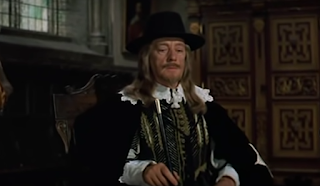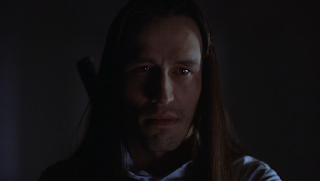Alec Guinness did not receive an Oscar nomination for portraying King Charles I in Cromwell.
Cromwell is more than decent realization, of a great story, about the rebellion of Oliver Cromwell in England.
Alec Guinness plays the secondary lead of the King of England Charles, who comes to clash with Richard Harris, a fitting firebrand, as Oliver Cromwell, featured here largely as a righteous freedom fighter. Guinness being an ideal actor for a quiet King, this as his presence is one that is striking even when silent as is the case here. Guinness's performance though is remarkable in creating Charles a complex figure within a story that could've potentially pressed him a simpler villain or even just a fool. Guinness's portrayal early on grants more than anything this weight of conflicted responsibilities. This as we see him speak towards those his Catholic wife views lowly, Guinness speaks with a tempering manner. An attempt to create a gracious quality of the man who wishes moderation. Guinness's voice though remarkably contrasting his eyes that speak towards the responsibility of a more personal level. This in the sort of recognition within his eyes a frustration with his wife, but also a resignation towards her wishes. Guinness does so much more than simply sit there, he creates a conflict within the man that is almost entirely unspoken yet wholly realized within his performance. Guinness showing Charles to not necessarily being a bad by nature but rather a leader compromised by his position.
Charles takes his wife's choices towards trying to arrest Cromwell and his acolytes. A scene that again is such striking work just by looking purely upon Guinness's performance. This as he speaks with just a calm authority of the arrests to be made, notable most against Harris's fierce passionate performance. Guinness showing the state of the man sticking towards a certain script as he declares the arrests, but again his facial expressions say so much. This in the glints of unease as he sees Cromwell's rejection of the events, and again finding a greater complication within Charles than perhaps the overall film even means to present. Guinness finds nuance within the depiction creating even in the battle scenes a man of a certain inadequacy. This as Guinness presenting Charles as being almost lost within the whole thing, with a certain sense of a gentleman's indifference towards the affair though it be more a game than an actual battle. After he begins to lose, we have a moment of him trying to figure out how to continue the battle. This as Guinness brings such sense of defeat as he speaks every attempted strategy. A sadness within the frustration of a man unaware of this kind of anxiety. A weakness of course is found in his work, but there is such a humanity he brings in this pathetic quality. This even in the way he so sadly holds his flag as he attempts, and fails to argue with his allies regarding his intentions to use whatever means necessary to win. Guinness wonderfully emphasizes the man, within the failure making Charles far more interesting than he would be otherwise.
Guinness finds a complexity within the weakness of the poor leader, and even a certain sympathy. Take the scene where he is almost at a loss, where one of his commanders has abandoned his defeated army. Guinness leading a weak bluster against the man attempting to maintain the claim as the strong King. After the man leaves though, any sense of confidence drifts from his face. This with a somber depression as his eyes show a man whose whole world is falling apart before his eyes. His moments of moving his men's pieces from the map is a simple one, but powerful within Guinness's portrayal of it with such a sincere sense of loss. Even when Charles is seeing off his wife and son, as Cromwell's army is closing in, it is not that of the villain getting his righteous defeat. This rather Guinness expresses a true heartbreak both in the personal moment of saying goodbye to his wife and son, but also in the sense of failure towards leading Great Britain. After his fall, where he remains a captive of sorts. We see the split of the man well realized on both ends by Guinness. This being the sheer warmth he brings in playing with family and a loving man in that. This against a meeting with Cromwell, who offers Charles a way out that Charles does not accept, which Guinness presents with a quiet stubbornness, a learned stubbornness from years of following an accepted path. This shown even when denounced as a tyrant.
Guinness presents a blithe indifference and questions the authority of the court. Guinness speaking with a privilege, mental privilege, of a man convinced by his very existence as a King that he must be beyond a normal judgement. The difference between the personal and the public though, Guinness finds a man who perhaps would've good as just a man, but as king, raised to be a king, is a terrible one. When he sentenced to be executed, Guinness's performance is essential and incredible in realizing Charles. This as it is not just a sense of fear, but a sheer emotional distress. This as Guinness's expression is of a man who cannot believe it simply could happen by way of his existence up until this point. Again Guinness so notably finding this moments to detail Charles more deeply. Guinness in doing this not only making Charles more interesting as a character, but also making his journey far more emotional than it would be. This in his final meeting with his family, Guinness is genuinely and powerfully heartbreaking. This as his face shows so sincerely the distress within the man awaiting his fate, while still speaking with a king's grace as he gives his son orders. Guinness showing though a loving family man in the moment, as his voice cracks as a man who genuinely loves his family. Guinness managing to make a moving portrait of the man, even while still realizing Charles as a bad leader. I love what Guinness does here as he offers such detail towards Charles as a man and as a King, I only wish the rest of the film brought the same level of attention to the more intimate elements of this potent tale.


































